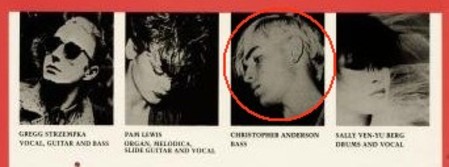
Chris Anderson's Lost Song Found
Nick Douglas
Valleywag
July 17, 2006
"Hits are going to have to share the stage with nonhits," says Chris Anderson in US News [ http://www.usnews.com/usnews/news/articles/060716/24qa.htm ], summing up his new book, The Long Tail. Chris's personal long tail stretches back into New Wave. The Wired Magazine editor-in-chief played bass for Egoslavia, a D.C.-based post-punk band that released one self-titled record in '82. Wired contributor Paul Boutin pulled out a copy of "Lost Song," the appropriately named first track. In the interest of rescuing it from obscurity, we're releasing the mp3. It's a real treat.
After the jump, Boutin remembers buying the record, zinesters describe the band, and the man who hired Anderson for Wired makes an Osmonds reference.
A lot of people's old band demos would be embarrassing, but the indie record store owner in DC who sold me the still-shrink-wrapped copy of Egoslavia said they were considered one of the key bands in the scene of that time there. "Ohhh, yes, Christopher Anderson," he recalled before launching into the sort of local band family tree only an indie record store owner straight out of High Fidelity could pull off 20 years later. He also said he was in the middle of shutting down the store to sell online only -- how fitting.
The band isn't listed on the All Music Guide [ http://allmusic.com/ ] or even Wikipedia, though it's mentioned in two rock history books [ http://www.amazon.com/gp/search/103-6932582-7911024?search-alias=aps&keywords=egoslavia ] and a few music-buff sites. One webzine writer [ http://www.oldpunks.com/oldpunks2.html ] says, "If I didn't live in Washington DC in 1982 when this came out and didn't see them live at the time, I never would have found this record."

Egoslavia, says the zinester, mimicked the style of Gang of Four, throwing in some Plastics and Pylon, for an "asexual post-punk funk" feel. In the few online accounts of Egoslavia, Anderson is rarely mentioned. Nostalgic punk fans instead focus on band leader Greg Strzempka, who went on to form the Southern boogie band Raging Slab [ http://www.allmusic.com/cg/amg.dll?p=amg&searchlink=RAGING|SLAB&sql=11:yg0e4j570wat~T0 ].
Anderson, meanwhile, moved from New Wave to New Media. Cond Nast's James Truman hired him to edit Wired, calling Anderson "a little bit geeky, and a little bit rock 'n' roll." Despite some media skepticism about Anderson's future (the New York Times [ http://select.nytimes.com/search/restricted/article?res=F50C10F73B5B0C718EDDAD0894DA404482 ] saw him as "fighting for custody" of Wired's soul in 2002), the ex-punk is now riding a wave of publicity well-deserved, thanks to his theory of the Long Tail.
In 2004, Anderson wrote and published a Wired feature story called "The Long Tail." His premise: In the new marketplace, selling a sea of little-known products can bring higher combined revenue than the top hits. Those little-known products make the Long Tail, shown below in a drawing from Anderson's Long Tail [ http://longtail.com/ ] site.
One upshot is that as retailers like Amazon and Rhapsody offer long tail products, more little-known items can gain a cult following or even become hits. But some would-be hits are still stuck in analog obscurity like Egoslavia's "Lost Song." Not any more. Drag and drop Egoslavia onto your PostPunk playlist, smack between Gang of Four and Romeo Void.
Copyright 2006 http://valleywag.com/